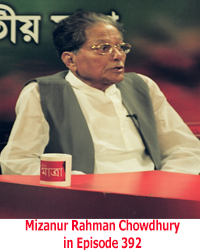Mizanur Rahman Chowdhury

| Former Prime Minister of Bangladesh |
| Politics |
Full Name: Mizanur Rahman Chowdhury
Affiliation: Jatiya Party
Current Position: Deceased
Date of Birth: October 19, 1928
Date of Death: February 2, 2006
Place of Birth: Bangladesh
Home District: Chandpur
Constituency: 264, 262, 263, Cumilla - 24 & 22 and Chandpur -4
Term: Fourth (1st-1973, 2nd-1979, 3rd-1986, 4th-1988)
Nationality: Bangladeshi
Profile:
Mizanur Rahman Chowdhury (19 October 1928 – 2 February 2006) was a Bangladeshi politician who served as Prime Minister of Bangladesh from 9 July 1986 to 27 March 1988 under President Ershad. He was former minister and former Member of Parliament represented Cumilla - 24 & 22 and Chandpur - 4 constituency. He was a member of the 1st, 2nd, 3rd and 4th Jatiya Sangsad and was a Minister in the Government of Bangladesh. During his political career, he served as the Minister of Information.
Chowdhury was born in a noble Muslim family in East Sriramdi village of Puranbazar in Chandpur district. His father was late Md. Hafiz Chowdhury and his mother was late Mosammat Mahmuda Begum. After completing his primary school studies in Chandpur, he studied in New Scheme Course at Nuria High Madrasa. He graduated from Feni College in 1952. He started his career as a head teacher at Bamni Junior High School, Tal Mohammad Hat, Companyganj Police Station, Noakhali. While in this school, he joined the government service by getting selected in the Provincial Public Service Commission. Later, he quit his job and started teaching as an English teacher at Nuria High Madrasa (New Scheme) in Chandpur without salary.
Chowdhury got involved in student politics in early 1944. At this time he got the responsibility of an organizer of Nikhil Banga Muslim Chhatra League. In 1945, he was elected the vice-president of the Comilla district branch of the Nikhil Bharat Muslim Chhatra League. In 1946 he was appointed Captain of the Muslim League Volunteer Corps. In 1948, Chowdhury was elected General Secretary of Chandpur Muslim Chhatra League and General Secretary of Chandpur College Students' Union. In 1950 he was elected General Secretary of Feni College Students' Parliament. He actively participated in the language movement of 1952.
Chowdhury was involved in student politics since college. He was elected Vice Chairman of Chandpur Municipality in 1959. In 1962, he was elected as a member of Parliament as a candidate of Awami League. He was arrested in December 1964 under the East Pakistan Public Security Act. He was released shortly before the election and was elected as a member of the National Assembly in the 1965 election. In 1970, he was again elected as a member of the National Assembly of Pakistan. In 1966, he was first elected as the Organizing Secretary of East Pakistan Awami League and later as Acting General Secretary. At this time he organized the historic 6 point movement. He was the chief organizational convener of the June 7, 1966 strike. He was arrested under the Defense of Pakistan Act on June 22 of the same year and was released in November 1967 by order of the Supreme Court. In 1968, he was nominated as the convener of the United Opposition. He is one of the shapers of the 1969 mass uprising. 1971 Chowdhury actively participated in the liberation war. At the beginning of the war, he built a defense system together with the local leaders of Chandpur. On March 31, 1971, he reached Agartala along with Malek Ukil and some other companions. During his stay in India, in the meeting of the central leaders of Awami League, he was given the responsibility of the Awami League organization during the liberation war. In the first cabinet of Bangladesh formed after independence in 1972, he became the Minister of Information and Radio. Chowdhury was re-elected as a Member of Parliament in the 1973 elections and was given the responsibility of the Ministry of Rehabilitation in the Cabinet. He was re-elected Member of Parliament in 1979. He led the Bangladesh delegation to the Commonwealth Parliamentary Conference held in Sri Lanka in 1974 and was nominated as a member of the Executive Committee of the Commonwealth Parliamentary Organization from Asia's single member quota. Mizanur Rahman Chowdhury on August 2, 1985 received a post in the cabinet and the responsibility of his ministry. In May 1986, he was elected as a Member of Parliament. On July 9, he was appointed Prime Minister of the Ershad government and served as Prime Minister until March 27, 1988, when the Council of Ministers was dissolved. He was elected as a Member of Parliament in the National Parliament elections held on March 3, 1988. Mizanur Rahman Chowdhury led the Bangladesh delegation to the Eighth Non-Aligned Conference held in Harare, Zimbabwe in 1986. In 1991 by-election, he was elected member of the National Parliament. His contribution in politics and social activities is also significant. He rejoined Awami League in 2001 and served as the party's advisor until his death.
Chowdhury died in February 2, 2006 in Dhaka.
Register for comment









